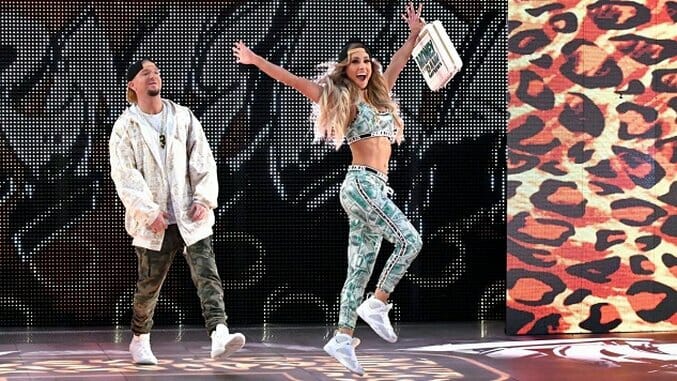James Ellsworth Proves WWE Has a Way to Go with Women and LGBT Representation
Photos courtesy of WWE.com
Let’s begin with the obvious: James Ellsworth being the person to grab the Woman’s Money in the Bank briefcase in a match built as one of historical import was, optically speaking, a bad call. Storyline decision or not, heat on Carmella or not, swerve or not, for two days all wrestling Twitter could talk about was how badly World Wrestling Entertainment undermined its long-stated goal of putting their women’s division on equal-footing with the men. For a match that promised history to end in the relatively muted visual of a man grabbing the briefcase is a plot point that needed a second draft. But the ongoing storyline implications of Carmella’s tainted win are not what I want to draw your attention to. Instead, I want to use WWE’s response to the outcry to analyze how it continues to fail in their attempt to include women and LGBT people in a fanbase that visually and vocally skews male.
The seeds for what was once called the #WomensRevolution were planted when AJ Lee, still under WWE contract at the time, publicly tweeted her boss, Stephanie McMahon, to ask why women didn’t get the same percentage of merchandise sales as their male co-workers. While that question was never answered publicly, it did give wrestling fans, many of them women, an indication of the vastly different landscape experienced by women wrestlers. While much of the credit for “evolving” the women’s division from the WWE Divas of the past has been given to the Four Horsewomen of NXT (Charlotte, Bayley, Sasha Banks and Becky Lynch), the scrutiny with which fans approached a historically lacking aspect of WWE programming began as a response to labor conditions. Before #WomensRevolution there was #GiveDivasAChance, the hashtag that emboldened Lee to tweet McMahon, which was a reply not to the perceived upgrade in quality, but to a 50 second match between the Bella Twins and Paige and Emma. Somewhere, an aide was directed to tweet “We hear you. Keep watching. #GiveDivasAChance” from Vince McMahon’s twitter account, and those who did were eventually rewarded with what we have today: Women’s divisions on Raw and SmackDown, the retirement of the Diva moniker, an upcoming women’s wrestling tournament on WWE Network, and, in NXT, a promising roster of women so far outside of one’s conception of a “female WWE superstar” that seeing them on WWE television now still feels a little uncanny.
All of this is marketing. Not that there’s anything wrong with that—with Twitter, Facebook and WWE Network subscriptions, World Wrestling Entertainment has never been as open or vulnerable to the criticism of its fanbase as it is now. In media, marketing is just another word for representation. The problem is that the people deciding how women are represented in WWE are almost exclusively men. This leads to the company’s incessant, cloying reminder that every time you’re seeing women in the ring with a ladder, in a cage with a roof on it, or wrestling for 30 to 60 minutes, it’s An Historic First. Truth be told, all the heat WWE gets for spoiling that with James Ellsworth is earned. If nothing else, it serves as proof of how effective their rebranding of women’s wrestling has been. #GiveDivasAChance happened in February 2015. In 2017, do things feel nearly as desperate for the women on the roster?
However thin the veneer of WWE’s commitment to portraying women as human beings is, their response to the backlash over Money in the Bank only goes to show how much farther away they are from their goal of appealing to LGBT viewers through their inclusion in the product. Wrestling fans are not opposed to fantasizing about a world where The Shield love each other as brothers in the streets and lovers in the sheets, and half the appeal of a tag team like Tyler Breeze and Fandango is how cartoonishly homoerotic their fashion police gimmick is. In 2016, Stephanie McMahon claimed that she saw an opportunity to integrate LGBT characters into WWE’s universe. This wouldn’t be difficult to do—Darren Young, WWE’s first openly gay active wrestler, has been out since 2013, and letting him be himself would probably be easier than whatever they were trying to do with him and Bob Backlund last year. But here you run into the same problems: how do you integrate gay characters into WWE without tokenizing the queer members of the roster, casting straight, cis wrestlers in queer and trans roles, or do any of this well with a writing team that is not only largely male, but, one presumes, is also mostly heterosexual, and is, without question, exclusively cis?
-

-

-

-

-

-

-

-

-

-

-

-

-

-

-

-

-

-

-

-

-

-

-

-

-

-

-

-

-

-

-

-

-

-

-

-

-

-

-

-








































